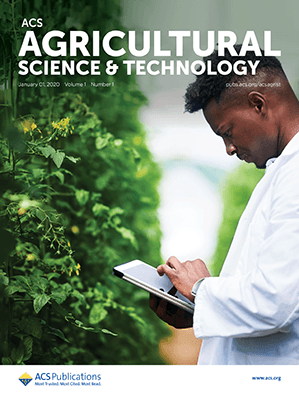The Journal of Agricultural and Food Chemistry is growing into a family of journals with ACS Food Science & Technology and ACS Agricultural Science and Technology in 2021. These two new journals will expand beyond the chemistry and biochemistry focus of the Journal of Agricultural and Food Chemistry with a special emphasis on the emerging […]

The Journal of Agricultural and Food Chemistry is growing into a family of journals with ACS Food Science & Technology and ACS Agricultural Science and Technology in 2021. These two new journals will expand beyond the chemistry and biochemistry focus of the Journal of Agricultural and Food Chemistry with a special emphasis on the emerging technologies in the two core fields covered by the parent journal. This expansion reflects the growing importance of innovations in science and engineering as it relates to food and agricultural research, as well as the growing communities and research output in these exciting fields.
I recently sat down with the new deputy editors for each journal, who both shared what they are most looking forward to.
Laura McConnell – Deputy Editor for ACS Agricultural Science and Technology
What are your goals as Deputy Editor?
My goals as Deputy Editor of this new journal, ACS Agricultural Science and Technology, are:
- Leading and collaborating with an experienced and diverse team of Associate Editors and Editorial Advisory Board members to maintain a high level of novelty and creativity for accepted manuscripts.
- Establishing AgSciTech as the premier journal for scientists working at the cutting edge of Agricultural Science while asking authors to consider novel technologies’ broader environmental implications.
- To provide a forum where scientists from university, industry, government research organizations can engage in a transparent and balanced scientific “dialog” on both the challenges and opportunities involved with novel technologies entering the agricultural marketplace.

What do you see as the biggest challenges and opportunities in the field today?
Agricultural science crosses the boundaries of many scientific disciplines, and disruptive technologies can impact research programs overnight. Numerous opportunities exist in agricultural science from a technology perspective. For example, gene-editing tools like CRISPR Cas9 offer opportunities to develop more nutritious crops that have longer shelf-lives or are more resilient to drought and storms in the face of climate change. Broadly available digital tools have revolutionized agriculture, allowing farmers to use inputs more precisely and effectively while minimizing negative environmental impacts.
Significant challenges also exist in maintaining a safe and abundant global food supply while protecting and enhancing precious soil, water, and air natural resources. Agriculture has a major role to play in addressing climate change. Agricultural production methods must evolve in order to increase ecosystem services like carbon sequestration and biodiversity protection on a large scale. Technology to quantify and verify sustainable practices’ impact is needed to establish sustainability-related markets whereby growers can reap economic rewards for their conservation efforts.
How do you see the journal and the community working together to address those challenges and seize those opportunities?
As an ACS journal, our team will reach out to and collaborate with ACS technical divisions like AGRO, ENVR, ANAL and others on both scientific programming and publications. We will reach out to ACS Committees, such as the Committee on Environmental Impact, on topics related to chemical risk assessment and risk management policy and sustainability. We will also reach out directly to universities and other research organizations seeking opportunities to develop special issues and viewpoint articles on cutting edge topics in Agricultural Science. We will also collaborate with organizations with a global viewpoint like the International Union of Pure and Applied Chemistry.
What types of research are you looking forward to reading in the future?
I am looking forward to reading the results of highly creative and innovative research efforts to solve a difficult challenge in agriculture. I am also looking forward to reading thoughtful manuscripts that provide a balanced analysis of their work, putting their results into the context of other research happening globally, and possible positive and negative impacts of their research. This type of writing approach can be an important part of the scientific dialog to advance knowledge and identify gaps for future research.
Coralia Osorio Roa, Deputy Editor for ACS Food Science and Technology

What are your goals as Deputy Editor?
As a Deputy Editor of the new ACS Food Science and Technology journal, I expect to lead a food science and technology network, joining forces between different researchers to improve the amount and quality of food supply worldwide, such as responding to the challenges of a post-pandemic world. This interdisciplinary journal is focused on reports of new and original research related to the characterization, development, processing, and safety of foods.
What do you see as the biggest challenges and opportunities in the field today?
It is inadmissible that in some countries, people die because they don´t have enough food to survive. In contrast, in other countries (mainly developed ones), people die due to lifestyle-related diseases, such as diabetes, obesity, hypertension, high cholesterol, and other cardiovascular diseases. It is also inadmissible that food is lost sometimes in producing countries because there are no adequate storage, packaging, and/ or post-harvest handling strategies. Thus, I think that underdeveloped countries need to work hand to hand with developed countries to solve these problems in an efficient way. And this new journal could be a channel to accomplish these goals.
How do you see the journal and the community working together to address those challenges and seize those opportunities?
I hope that this new journal, as well as ACS Agriculture Science & Technology, the other new journal related to Journal of Agricultural and Food Chemistry, will be recognized, not only by the scientific community but also by the industry, as a source of relevant and credible research that helps food and agricultural sciences to develop. ACS Food Science & Technology will address the challenges we face in a post-pandemic world, finding solutions through science and technology and strengthening international cooperation.
What types of research are you looking forward to reading in the future?
Food science is an interdisciplinary field. The journal is specifically interested in three big work fronts that we consider relevant now and in the future: food security, food preservation, and health-promoting food ingredients. Food security is related to ensuring the food supply with good quality for the entire world population. This is a challenge for humanity because it has been affected by different factors, such as climate change, sanitary emergency, and population increase, among others. Food preservation is another challenge that maintains food quality during storage and prevents food from being wasted. Health-promoting food ingredients help avoid or prevent lifestyle diseases that are one of the main causes of mortality worldwide and boost the immune system. We are suffering the impact of Covid-19, but it could be possible in the future to have other viruses. Thus, a healthy immune system is our trustworthy protection.
